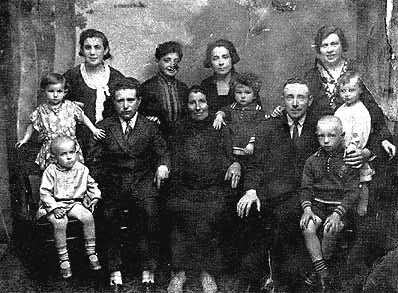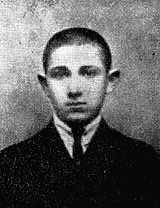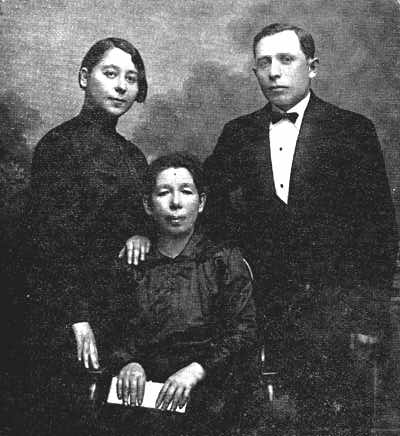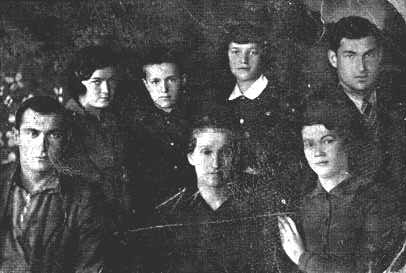
|
|
I left Dokshitz 34 years ago when I was 20 years old. I vividly recall how sad I was when I took leave of my family and my mother who was bedridden because of her illness.
The memories of what the town looked like and its personalities have become vague, but whenever I meet people from Dokshitz I remember the personalities because of their nicknames ("Tsunamen") which existed in almost every family. The events in my little town that occurred when I was young are deeply engraved on my memory. Most of the memories are enveloped in sorrow and but a few offer some consolation.
I would like to use this opportunity to write about my mother and my relatives who perished together with the other victims of the town. I don't remember my father, he passed away at the outbreak of World War I, when I was only two years old.
My mother was left with 7 children, two sons and five daughters. I can see her standing before me, burdened by the need to feed us and take care of all our needs. I don't understand how she managed to carry out her many tasks. My mother was a perfect housewife, managed a shop and even found time for charity. A "Yiddische Mame" &emdash; in the full sense of the word. Very orthodox and strict about the rules of kashrut. During religious holidays she looked glamorous when she blessed her seven children. We would sit around the long table, the candlesticks shining and a festive meal spread out in front of us. We sinned, according to mother's standards, but she pretended not to notice. She did not say a word, for during the religious holidays we would sit around the table with her and she considered this her achievement.
As the youngest daughter my mother showered me with love and affection. There was a very strong bond between us and I too loved her very much. When I joined "Hehalutz" differences of opinion arose for my mother, like many other parents, tried to prevent me from going to Eretz Jisrael. It was hard for my mother to accept the fact that I would not be at her side when she would be old. Nevertheless, she continued to treat me with devotion. In the end she even accepted my aliyah and helped to prepare it. My mother died from heart disease at the Dokshitz ghetto.
Chaim, my oldest brother, was the central figure among the children in the family. At an early age he undertook the burden of looking after the family. As he was a businessman and gifted accountant he was very popular in the business life of our town. He set up a cooperative together with five wealthy men &emdash; a trading house that supplied merchandise to the grocers in the town and its vicinity. He would bring his earnings home and his family was his first priority. He wanted to take care of us, his sisters. Although he was strict we showed him respect. Chaim married late and although he had to take care of his own household he continued to take care of us.
His wife Lisa from Gleboki was a kindhearted and sensitive woman. She had excellent relations with us. Chaim too tried to prevent our aliya to Israel, but in the end he understood that the future of our town did not look very bright and he saw the dark clouds casting their shadow over the Jews in Poland and agreed to let me go. Chaim even financed the cost of my trip to Eretz Jisrael.
During the Russian occupation, at the outbreak of the War, Chaim moved with his family to another town where he was employed as an accountant and here he, his wife and son and daughter came to their bitter end.
Moshe Aharon was 5 years younger than Chaim and had a different character. He did not have a talent for business like Chaim. On the other hand, he was kind and easygoing, liked by the whole family. He joined the cooperative and it was his task to find buyers outside. He was successful in this due to his pleasant nature. He was a Zionist and absorbed the "haskalah" spirit blowing through the Jewish world. His circle of friends was also Zionists and our home became a center for this circle. Although they did not plan to implement their ideas they contributed much to spread the love of Zion.
Moshe Aharon married Lea, the daughter of Ascher Shapira, and left home. When I came to Israel he had two sons. When the Russians entered Dokshitz my brother suffered tremendously. He found it difficult to get used to physical labor, but the Russians forced him to do so in order to earn a living. He fell ill with diabetics and died at the Dokshitz ghetto together with the members of his family.

My sister Sara Esther was the tragic figure of our family. She did not find her place among the many children. She excelled at her studies and was among the few to graduate. As it was impossible to be accepted at the university in Poland, she tried to move to Russia, but failed. Life in the little town was too narrow-minded for her and this caused her permanent bitterness. She was a cause of concern to her mother. My good brothers made many efforts to find a suitable husband for her. She married and moved to Vilna, but did not find her luck there either. During the economic crisis in Poland in the thirties Esther-Sara lost her money and lived in poverty. She, her husband Yehuda and their two little sons died in the Vilna ghetto.
Four sisters remain of the Kopelowitz family. I built my home at Ein Harod with my childhood friend, one of Dokshitz's best young men, Chaim Solovey-Zamiri. In 1965 in the month of Nissan, Chaim passed away. My sister Bella found her home at kibbutz Yifat, together with her family, and she knew many ups and downs during her 37 years in Israel.
Rosa, our oldest sister, arrived in Israel 6 years ago with her son Shimon, the only one left of her family. She lost her husband, a son and a daughter in Karasna. The Nazis murdered them all. The 2 sons of my sister Ida, who is in South Africa with her husband Miram Poliak, came to Israel with their families. We hope that their parents too will come to Israel together with their son Joseph, and that the remaining members of the Kopelowitz family will no longer have to bear the sufferings of the Diaspora.
Our parents, may they rest in peace, Baruch and Faighe Sossman were killed about two weeks before Passover, just then, when the slaughter did not as yet begin.
It was midnight. We were at grandfather's house, where we then resided. We heard knocks on the door. Five gentiles walked in, residents of our town, friends from school. They ordered us to stand facing the wall, and tied the hands of father and mother, my brother Isha'ayahu, Ziama Lifshitz and his wife Duba, Isha'ayahu's wife Shifra and the three-months-old twins. My father lost control but my mother began to beg and to try to convince them. They then released me and my sister-in-law with the babies. They took my brother, my husband and his parents, all still tied up, out of the house and dragged them to the pit. My brother and my husband, Ziama managed to escape, and my husband was killed later during the second slaughter.

At four o'clock in the morning Isha'ayahu stepped outside and saw that the ghetto was surrounded. Somehow, we managed to descend to the hideout but without the children. At that time the Germans were already inside the house. Through the slits in the floor beams we saw how the Germans tore the babies apart holding their legs. In the hideout we remained nine persons. We stayed there ten days without food nor drink. We smeared our lips with our own urine. We had only the air that came through the tiny slits of the hideout and we began to swell up. We then decided to leave the place for we knew we could take it no longer under any circumstances.
Isha'ayahu took it upon himself to lead us, since he had been a soldier and also knew the area well. On his order we all crawled out in a straight line up to Gordon's pool. From there we walked to the house of a gentile of the Karpovka village (4 k"m from the town) who knew us. The gentile took us to his barn and brought us food but ordered us to leave the following day.
Swollen and barefoot we continued towards Gleboki, where we still had family and so did my brother's wife. The gentile promised us that Gleboki was still full of Jews and that word of slaughter had not yet reached the town. My brother led us to Gleboki through the Krolevshtchisna road, through the fields. On the way, we had to cross the railroad tracks where a gentile with his son†noticed us and notified the Germans. Not far from there was a bushy grove and when we reached it, we were shot at. It was 22:00. We laid there until 02:00 and when the shooting ceased, we crawled 3kms further. I could see shepherds herding their flock to pasture. We had no other choice, we approached them and said nothing. They, also said nothing and among them we entered Gleboki.
The loss of parents, brothers and sister; the screaming of the babies, only three months into this world, never ceased to ring in our heads. My brother raves like a madman, never finding rest. The slaughter has begun again. They called the younger ones to come to work an then they shot everyone. Isha'ayahu screams: "I want revenge and I'll have it!"
Yes, thirty years have passed since my brother Isha'ayahu died a hero's death, in order to avenge. He was my younger brother, born in 1910, a handsom man and well developed in all areas. when the slaughter began in town, my brother's burning desire was to avenge the spilt blood of the Jews, the innocent blood of many children, his own, his parents, brothers and sister.
He fought like a lion in his cage to find a way for revenge. During hte last slaughter in Dokshitz, we stayed alive thanks to Isha'ayahu who took us under German fire, in an abominable way, to the Gleboki ghetto. Isha'ayahu imeadiately set out to leave for the forests. He joined a group of young men and left us to wait until he could come and get us. His plans did not work. He returned barefoot and empty handed. The Russian partisans stole everything he had and sent him back. Alas, he did not give up. His will to avenge had not left him. He organized a group of 12 men and planned to take more Jews out of the ghetto. After wandering from place to place, Isha'ayahu met a group of partisans from the brigade named after Medvedev, near Miadel. There were gentlile partisans from our area there and they had known Isha'ayahu before. They presented him to the commander of the brigade and recommended him.
The commander gave him a mission. If he succeeded, he and the women with him would join the partisans. He was told, as well, that a few commerads have already been sent on this same mission - none came back. Isha'ayahu is not frightened. There is nothing to lose, and he accepts the mission.
The plan is: To reach the train station of Molodetchna, find out from the train conductors which trains pass there and when. Not far from the station there was an ammunition dump with rifles and granades. The order is to blow up the train and bring the weapons. The time: Ten days. Isha'ayahu sets out. Ten days pass and my brother does not return. We are forced to leave the place. The next day - the eleventh - my brother arrives. He has done it. Two trains with soldiers and guns, headed for the front, were blown. Isha'ayahu and his peers killed the guards and brought the weapons for the partisans. Thus, his will was done -blood for blood.
Isha'auahu became the commander of a special group. He was joined by another hero - Yodel Yassin, born in the village of Tamilovitch, near Dokshitz. These two never missed an attack against the Germans. Every night they would burn the German camp in the vicinity. The militias and the Germans in the area lived in fear. Komulka, the commander in Dokshitz, put a price on their heads, saying he wants Isha'ayahyu Sossman dead or alive - only then will he have quiet. After every operation Isha'ayahu would come back happy and singing. We asked him: "What is this hapiness?" He then answerd:"I'm avenging! My life is short". The night before he was killed his group had performed an important operation. In the morning, the commander wanted to know how the operation affected the populace and they left to check. Isha'ayahu wanted to join them and they wouldn't let him. "Rest", they said, "More work in the evening". Isha'ayahu refused. He joined them on his mare. When they reached the village of Trestchanitza, he falls into a trap. A battle ensues and my brother Isha'ayahu gives his life as a hero.
He was buried with much magnificence. The partisans mentioned his couragous acts. He lays on a hill near the village of Trestchanitza, near Dokshitz. His friend Yodel Yassin fought to the vey end and was killed.
Mula Kuggel never even left the hideout. His life ended there - waiting. His wife and children came out with us but went another way and did not come back.
Written down by Yossef Shapiro, Ra'anana, Israel
He was only 19 when he gave his life in a battle near Warsaw, and still so fond of life. Moshale was a studious fellow, serious and shy. Speaking with the girls in his class, he was embarrassed and would blush. We all loved him as a loyal peer and friend. He eas a loved and loving son. He could not stay in the rear while bloody and bitter battles took place at the front lines. He wanted to take an active part in the front. Moshale studied in the "Tarbut" school and managed to study for two years in a "Yeshiva" in Vilna before the Red-Army arrived. With the founding of the Yiddish school he entered the ninth grade with the rest of his age group. Together, we finished the eleventh grade, already in the midst of Siberia, in a Kolchoz near Nuvosibirsk... The conditions were unbearable. We had no warm clothing and no warm footwear. We would take turns using a coat and a pair of boots. Often, we would be undernurished and life was harsh. Moshale, nevertheless, succeeded in finishing his studies with distinction.
Two years after public school, he constantly wrote to the military school, trying to be accepted, but being part of a persecuted people, he was turned down again and again. This saddened him tremendously. "How could I sit still without avenging my people's shame and suffering?" He would say. As he had no alternative, he accepted this fact that so grieved him. He applied to a higher academic school and was accepted, but this was not to be. The situation in the front lines worsened. The Red-Army began mobilizing westwards and it was then that Moshale received his much yearned for draft notice. After three months of basic training, he was sent to the front lines. He did not attain victory, his life was extinguished in battle. His parents and the holders of his memory mourne his death. Blessed be his memory!
One day, my brother went to the market and came home carrying a handsome boy on his shoulders who had lost both his legs. My brother said he had found him begging at the market and struck up a conversation with him. He soon found out that the boy had been wounded in the war and lost both his legs. Zosia carried him to our home and lovingly took care of him for two weeks. My brother would work and save money in order to buy artificial limbs for the invalid. He then sent him by train to the nearest town with a letter of recommendation to the Rabbi. He considered this a natural thing to do.

I remember your letters, always in the same style. You would ask me for help, for the ground was burning under your feet. And I wanted so much to help, but was unable to do so. You had a wife and children and according to your letters you were happy in the midst of your family. You refused to run away and be saved and you took the road, together with your family, from which there was no return. I see you in front of me, but your face is not clear, for my eyes are filled with tears.
Dokshitz was a typical little Jewish town, surrounded by gentile villages which lent it its special character. The low houses were lined up along 4 main streets from which alleys emanated. The majority of the town's inhabitants were engaged in trade and crafts and barely made a living.
The social life of the older generation focused on four synagogues at a place called "Schulhoif". On the other hand, the majority of the young belonged to various youth movements such as: "Hashomer Hatza'ir", "Hehalutz", "Beitar" etc. There were two schools: "Tarbut" and the Polish elementary school. In order to continue studies one had to go to Vilna, Gleboki or other places. Our home, which I fondly remember, stood on Koschiosko street (Gleboki-Gasse) no. 6. Boys and girls used to spend the greater part of their free time at our home.
We were a family of 6: grandfather Abraham, grandmother Zlata, mother Hava-Rahel and the three children – Joseph, Moshike and Sonike.
All the inhabitants of the little town knew each other and it sufficed to say that I was "Avremel Shimon's ainekel" (the grandson of Avremel Shimon ) for everyone to know immediately to whom I belonged. We did not know our father for he died when we were still very young. My grandfather supported the family and in due time my brother Mosheke helped him.
The life of the Jews in the little town was not easy. My mother also took an active part in supporting the family and assisted in trade – the main income was from the sale of linen and grain.
My mother, a very lively and smart woman, petite and full of energy, managed the household and educated her children. She had a very difficult life, but she knew how to overcome and always found moments of joy and mainly the joy of bringing us up and teaching us. Her joy was even greater when her children were cited as a good example to others. This is what gave her strength and satisfaction in her miserable life.
My brother Joseph was a gifted student, clever but physically weak. He very much wanted to continue his studies, but our limited possibilities forced him to quit. He taught himself, had a broad knowledge and was called "a walking encyclopedia". He studied accountancy and became an expert in his profession. It was his fervent wish to go to Israel and join kibbutz Ein Shemer. He spent two years on hachshara, but did not go on aliya for he did not manage to obtain a "Certifikat".
Once my second brother Moshe finished elementary school he became a great help to my grandfather. His sense of business and excellence were enough for him to start work. Moshe was a healthy boy, handsome and kindhearted. He belonged to the "Hashomer Hatzair" movement but the burden of making a living did not allow him to leave home. In due course he married Mattele Halbanowitz, and they built a home. They had a son, but I did not get to know him. I hoped all this time that he managed to escape the Nazi beast, but to date nothing has been heard of him.
I remember my mother's last words before I left for Israel: "Sonika, I always want to be near you and live together with you. Remember this – as the parents of Mendel Markman – to live at a kibbutz. . ." She was very much attracted by kibbutz life and was sure that in the future we would live and work together in Israel.
It is with deep sadness that I heard what happened to our little town and to my dear family in the war. I can imagine those terrible last days they passed, the suffering of the innocent victims. My relatives are deeply engraved on my memory as if they are still with me today. I must mention a number of families to whom our home was a second home: the Rozov family (Der Hittelmacher), Liba Rozov who I loved so much. The parents of Batia and Shaul Markman, the Solovey family, Kamankowitz who lived opposite us and the Kloner family and many others who are no longer with us today. Blessed be their memory.

|
|
JewishGen, Inc. makes no representations regarding the accuracy of
the translation. The reader may wish to refer to the original material
for verification.
JewishGen is not responsible for inaccuracies or omissions in the original work and cannot rewrite or edit the text to correct inaccuracies and/or omissions.
Our mission is to produce a translation of the original work and we cannot verify the accuracy of statements or alter facts cited.
 Dokshitz, Belarus
Dokshitz, Belarus
 Yizkor Book Project
Yizkor Book Project
 JewishGen Home Page
JewishGen Home Page
Copyright © 1999-2026 by JewishGen, Inc.
Updated 21 Feb 2003 by LA